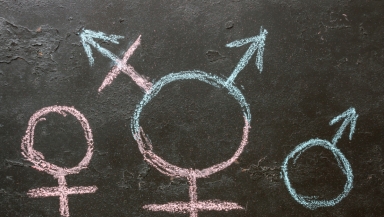
Seven years ago this month, National Geographic published an issue that they now refer to as "historic." With a cover featuring a young boy with long pink hair and pink leggings, they announced a "Gender Revolution." The newsstand edition featured a different cover, a child and a collection of hip young people with identifying labels, such as "transgender female," "androgynous," and "bi-gender." Our perceptions of those who are transgender, these covers suggested, should not be simply men with a fetish. Rather, embracing new understandings of gender was about the kids.
In addition to the articles explaining the emerging "scientific consensus" around these things, and why "gender" is "fluid" and should be thought of as distinct from one's biology, one article focused on the challenge of "toxic masculinity." Five others promised that rethinking gender would elevate women. The journalists accurately predicted that a revolution was occurring, even though some who read the issue (me included) thought their announcement premature. However, seven years later, it's clear that the gender revolution has done everything but elevate women.
As child psychiatrist Miriam Grossman, author of Lost in Trans Nation, explains, the number of teen girls "with recent-onset discomfort with their sex is up 4,000 percent [emphasis added]." Especially vulnerable are girls with comorbidities, like autism, an association that even one of the National Geographic articles acknowledged. People who are autistic are three to six times more likely to not identify with their birth sex. Child psychiatrist Dr. Steven Grcevich, the founder and president of a ministry for families with hidden disabilities, called this "[t]he scandal that nobody is talking about ... the vulnerability of kids with pre-existing medical conditions and autism and other developmental disabilities to this gender ideology."
According to Dr. Grossman, this social contagion has been especially driven by social media, which has become a virtual "assembly line" for challenging girls to question their sense of self. Medical professionals jumped in, resulting in a trail of mutilated bodies, sterilization, bone-density loss, and other irreversible damage done.
Women have been hurt in other ways too. According to the Telegraph, a male student recently attacked female students in a gender-neutral bathroom. In sports such as in jiujitsu and volleyball, girls have been overpowered and injured, not to mention the other issues of fairness of competition, scholarship opportunities, and privacy concerns.
Seven years ago, the first article in the "historic" National Geographic issue promised that "science is helping us understand gender." In what became a frequently used "bait and switch" tactic, the article focused on the incredibly rare conditions called "intersex" or "disorders of sex development." Not mentioned in the article is something that Abigail Favale clarified in her book, that "[i]n 99.98% of these cases, sex is readily recognizable as unambiguously male or female." Instead, the author lumps physical disorders of sex development with the mental conditions of gender confusion, via a mishmash of edgy psychology and personal narratives, with one neuroscientist stirred in for good measure. The takeaway is clear: All that matters is what an individual feels on the inside.
And yet, there are clear signs that this revolution is slowing. Finland, Sweden, the United Kingdom, and Norway have all drawn back from providing so-called "gender-affirming care" to young people because the science is not settled. Though the Biden Administration seems committed to advancing the revolution by force, in states such as Missouri and Ohio, lawmakers are taking definitive steps to protect children.
The credit for slowing down what seemed to be an unstoppable train headed off the cliff goes to a coalition of unlikely allies: from the so-called "TERFs" (or "trans-exclusionary radical feminists") like Harry Potter author JK Rowling, to brave young people like Chloe Cole who have "de-transitioned," filed lawsuits, and testified before state legislatures, to Matt Walsh. Twenty-two states have now stopped or limited so-called "gender-affirming care" for minors.
National Geographic may have thought that the "gender revolution" was inevitable, but it's time for an update on the cultural state-of-play. Next Tuesday, January 16, at 7 p.m. ET, the next free online Breakpoint Forum will provide "The Real Facts About Gender Ideology." Featured presenters are child psychiatrists, Dr. Miriam Grossman and Dr. Steven Grcevich.
Sign up to join in live and ask questions, or to receive a link to access the recording. Go to breakpoint.org/forum.
Copyright 2024 by the Colson Center for Christian Worldview. Reprinted from BreakPoint.org with permission.













